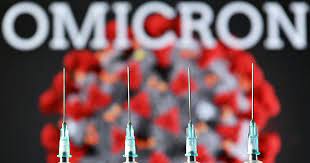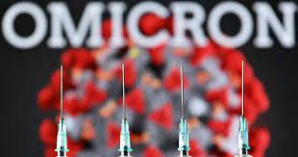Although there has been an increase in Covid-19 cases in the megacities in India - Delhi, Mumbai, and Kolkata, without a commensurate increase in hospitalizations, fears are mounting that the virus will move to rural areas in the coming days.
On Thursday, India reported 90,928 new Covid-19 cases, up roughly fourfold from the beginning of the year, particularly in cities where the Omicron version has surpassed the Delta variant, according to health officials.
According to officials, the majority of people infected have displayed no or only moderate symptoms and have recuperated rapidly at home.
The federal health ministry highlighted Delhi, Mumbai, Kolkata, Chennai, and Bengaluru as some of the primary areas of concern on Wednesday, though state officials are concerned that the disease would quickly spread to rural areas with fewer health resources.
Up until the last few days, Kolkata, a city of over 15 million people, accounted for half of the new cases in the eastern state of West Bengal, but cases are now rising in neighboring areas. Infection rates in the state have been reported to be among the highest in India.
"We are watching the situation in the districts and rural belts where the numbers are also growing," said Ajay Chakraborty, director of the West Bengal health services who has isolated himself at home after contracting the virus.
Many COVID beds in Kolkata were still empty, Chakraborty said. In the government-run Infectious Diseases and Beliaghata General Hospital, only 75 admissions were recorded on Tuesday despite more than 9,000 new cases, he added.
In the west, Mumbai recorded a new daily infection peak of 15,166 on Wednesday, well up on its previous high of just over 11,000 hit last year. Nearly 90 per cent of new patients had shown no symptoms and only 8% were hospitalized, city officials said in a daily health bulletin.
Covid-19 cases nearly doubled in a day in Delhi to 10,665 on Wednesday, but the state said only 7 per cent of its Covid-19 beds were occupied.
However, many of the designated Covid-19 beds in Kolkata remained unoccupied, according to Chakraborty. Even though there have been more than 9,000 new cases, only 75 admissions were registered as on Tuesday at the government-run Infectious Diseases and Beliaghata General Hospital, he noted.
Mumbai, in the western part of the country, touched a fresh daily infection high of 15,166 on Wednesday, which was significantly above the previous high of slightly over 11,000 set last year. In a daily health bulletin, city officials reported that over 90 per cent of new patients showed no symptoms and only 8 per cent had been admitted to the hospital.
On Wednesday, the number of patients in Delhi increased nearly two folds in a day, to 10,665, but the state stated only 7 per cent of its Covid-19 beds had been occupied.
Night curfews and lockdowns during weekends, as well as school closures, have already been implemented in many Indian cities. Political rallies, on the other hand, have persisted in a number of states where elections are scheduled to take place in the coming weeks and months.
(Source:www.ndtv.com)
On Thursday, India reported 90,928 new Covid-19 cases, up roughly fourfold from the beginning of the year, particularly in cities where the Omicron version has surpassed the Delta variant, according to health officials.
According to officials, the majority of people infected have displayed no or only moderate symptoms and have recuperated rapidly at home.
The federal health ministry highlighted Delhi, Mumbai, Kolkata, Chennai, and Bengaluru as some of the primary areas of concern on Wednesday, though state officials are concerned that the disease would quickly spread to rural areas with fewer health resources.
Up until the last few days, Kolkata, a city of over 15 million people, accounted for half of the new cases in the eastern state of West Bengal, but cases are now rising in neighboring areas. Infection rates in the state have been reported to be among the highest in India.
"We are watching the situation in the districts and rural belts where the numbers are also growing," said Ajay Chakraborty, director of the West Bengal health services who has isolated himself at home after contracting the virus.
Many COVID beds in Kolkata were still empty, Chakraborty said. In the government-run Infectious Diseases and Beliaghata General Hospital, only 75 admissions were recorded on Tuesday despite more than 9,000 new cases, he added.
In the west, Mumbai recorded a new daily infection peak of 15,166 on Wednesday, well up on its previous high of just over 11,000 hit last year. Nearly 90 per cent of new patients had shown no symptoms and only 8% were hospitalized, city officials said in a daily health bulletin.
Covid-19 cases nearly doubled in a day in Delhi to 10,665 on Wednesday, but the state said only 7 per cent of its Covid-19 beds were occupied.
However, many of the designated Covid-19 beds in Kolkata remained unoccupied, according to Chakraborty. Even though there have been more than 9,000 new cases, only 75 admissions were registered as on Tuesday at the government-run Infectious Diseases and Beliaghata General Hospital, he noted.
Mumbai, in the western part of the country, touched a fresh daily infection high of 15,166 on Wednesday, which was significantly above the previous high of slightly over 11,000 set last year. In a daily health bulletin, city officials reported that over 90 per cent of new patients showed no symptoms and only 8 per cent had been admitted to the hospital.
On Wednesday, the number of patients in Delhi increased nearly two folds in a day, to 10,665, but the state stated only 7 per cent of its Covid-19 beds had been occupied.
Night curfews and lockdowns during weekends, as well as school closures, have already been implemented in many Indian cities. Political rallies, on the other hand, have persisted in a number of states where elections are scheduled to take place in the coming weeks and months.
(Source:www.ndtv.com)






